Independent evaluation of WHO’s Whole of Syria response, 2021
13 January 2022 – The evaluation, commissioned by the WHO Regional Office for the Eastern Mediterranean, with support from the WHO Evaluation Office, assessed WHO’s emergency response in Syria due to the conflict from 2016 to 2020, including its strategy, interventions, operations, performance and results, as well as its engagement and coordination with partners toward these same ends.
It included operations conducted through the main office in Damascus and sub-offices within Syria, cross-border operations from Gaziantep, previous cross-border work from Erbil and Amman, Whole of Syria Health Cluster coordination from Amman, and support and coordination from the WHO Regional Offices for the Eastern Mediterranean and Europe and WHO headquarters. It generated comprehensive learning on WHO’s operations and performance in Syria, while informing WHO’s humanitarian work in emergency contexts elsewhere, the policy and practice of the WHO Health Emergencies Programme and WHO's Thirteenth General Programme of Work.
Final report: Independent evaluation of WHO’s Whole of Syria response
EU bolsters WHO’s COVID-19 response in Syria
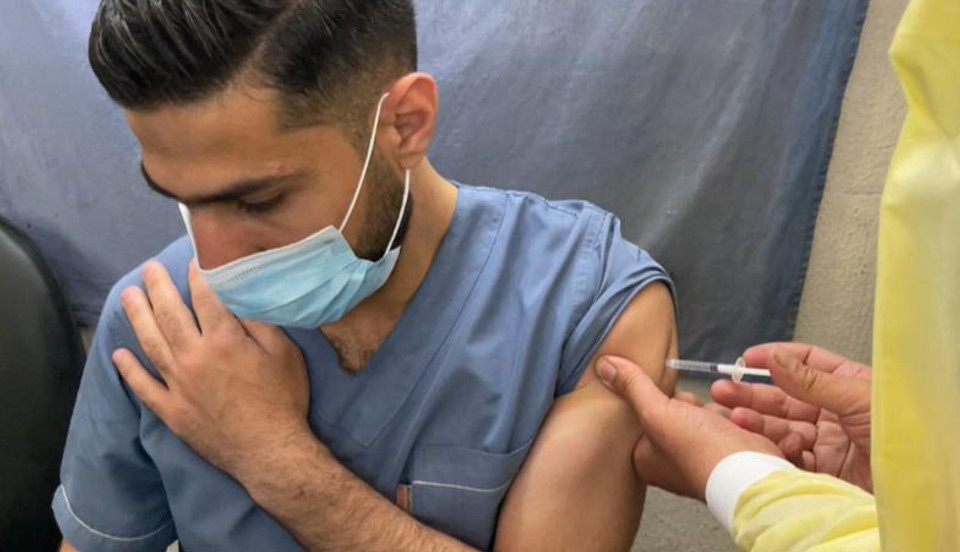
23 December 2021, Damascus – The EU is allocating an additional €1 million to the World Health Organization (WHO) in Syria to strengthen the COVID-19 response. The humanitarian funding will primarily be used to increase testing capacity and scale up vaccination across Syria.
Health services in Syria are overstretched, the health workforce is working around the clock, and supplies and resources are depleting quickly to address the increased demands of the COVID-19 response.
“WHO continues to provide critical support to respond to the prolonged fourth wave of the COVID-19 pandemic in Syria. We appreciate the EU’s latest contribution which will help operationalize vaccination teams to administer newly delivered vaccines and enhance COVID-19 testing capacity to contain emerging cases,” said Dr Akjemal Magtymova, Head of Mission and WHO Representative. “Vaccine hesitancy remains the biggest challenge. We call on all partners to join forces in order to increase vaccine uptake and curb the pandemic.”
The funds will enable WHO to cover part of the vaccination’s operational costs in the coming months and to support 840 vaccinators at fixed facilities; 770 vaccinators at mobile centres in both accessible and hard-to-reach areas; 510 supervisors; 148 supply officers; and transportation costs.
European Commissioner for Crisis Management, Janez Lenarčič, said: “EU support to WHO in Syria is crucial to ensure COVID-19 testing and vaccination capacity are urgently stepped up. We need to stand by the Syrians who are threatened by this pandemic, in addition to suffering the continued consequences of conflict and economic hardship. The EU is committed to shielding the most vulnerable people and caregivers from COVID-19’s full force.”
In northwest Syria, WHO will supply COVID-19 PCR kits and sample collection kits to enable 70,000 additional tests at six laboratories. The number of vaccination teams will increase from 40 to 61 by May 2022; 21 teams will be based at fixed health facilities and 40 others will be mobile, targeting people in hard-to-reach areas and camps for displaced people in northwest Syria.
In September this year, the EU contributed €1.5 million to support laboratories and non-governmental organizations in responding to the pandemic. The new €1 million contribution will help maximize efforts to reduce the number of COVID-19 cases in Syria.
Media contact
Gulalek Soltanova
External Relations / Communications Officer
WHO Syria Office, Damascus, Syrian Arab Republic
+963 953 888 477
Health care workers and frontline community workers in Syria play a critical role in creating the demand for vaccines
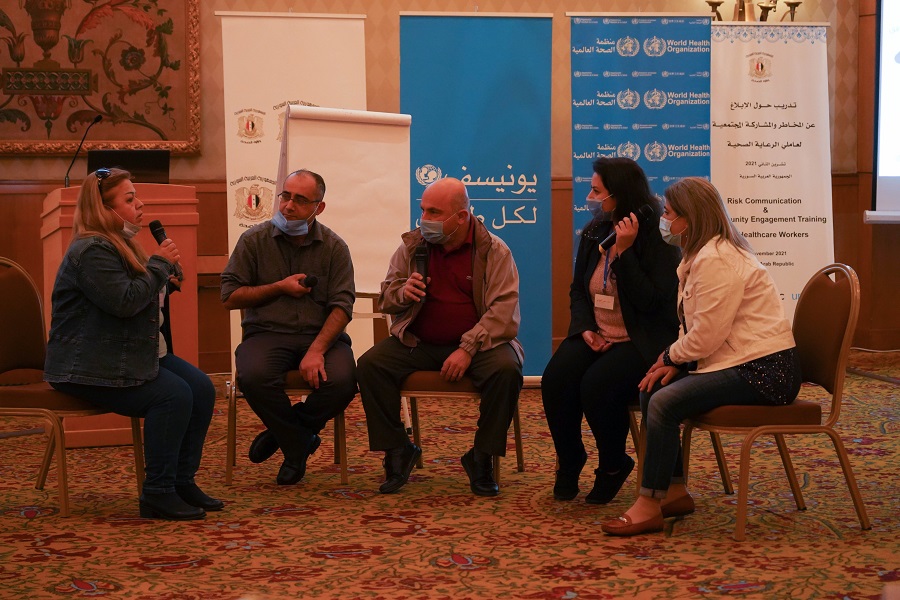
14 November 2021 – This week, as key players in creating demand for vaccine, Syrian health care workers built their capacities and strengthened skills in managing vaccine hesitancy as part of the COVID-19 response. The interactive training organized by the Ministry of Health and WHO, in partnership with UNICEF, IFRC and SARC aims to identify and address issues that may affect vaccine uptake in the community – issues that include health workers’ personal concerns and beliefs about vaccination.
“Availability and accessibility of COVID-19 vaccines do not automatically guarantee an effective rollout and uptake among the Syrian population. As more COVID-19 vaccines are delivered to Syria, all concerned sectors are joining hands to facilitate vaccine roll out and acceptance to reach the national target of 20% by the end of the year,” said Dr Akjemal Magtymova, Head of Mission and WHO Representative in Syria.
Our collective work now is not limited to combating COVID-19, but also building national capacities and skills to address strategically vaccine hesitancy, rumours and misinformation that may pose an even more serious threat. Throughout the ongoing vaccination process and as more vaccines have become available, the health care workforce will play a critical role in supporting effective risk communication and community engagement to promote the safety and efficacy of vaccines to help increase the vaccination rates.
Update on COVID-19 vaccination in Syria, 12 November 2021
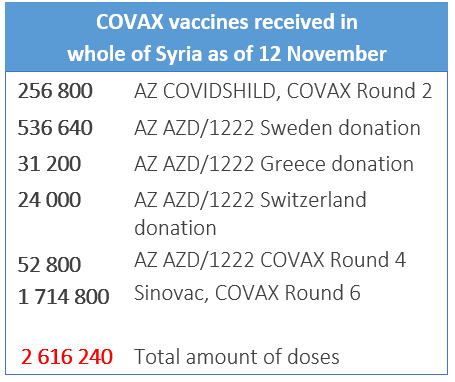 Summary
Summary
On 5 November 2021 Syria received 1 356 000 doses of Sinovac through the COVAX Facility. The same round allocation of 358 800 doses of Sinovac were delivered to northwest on 3 September to increase availability of vaccines to respond to emerging needs of the population. After the first consignment received in April this year, this batch is the largest to arrive via COVAX and represents 66% of all COVAX deliveries. Vaccines will be administered as part of the ongoing national vaccination campaign across the country. Syria also received 115 200 doses of AstraZeneca (AZ) vaccine supported by Sweden through the COVAX Facility on 6 November. On 4 November 108 000 doses of AstraZeneca were delivered to northwest Syria through COVAX.
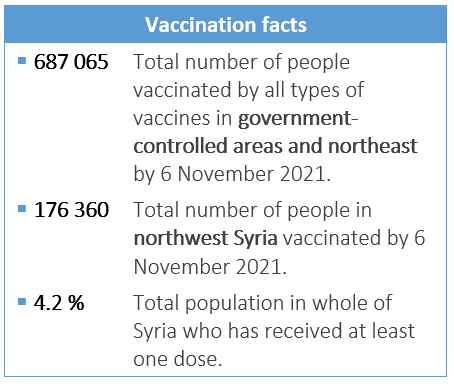 As of 12 November, 2 616 240 doses have been delivered through COVAX and 1 345 000 through bilateral agreements – enough to cover 10.2% of the population. Over 7.3 million doses of vaccines are expected to be delivered in the nearest future through COVAX, which is sufficient to cover additional 27.7% of the population.
As of 12 November, 2 616 240 doses have been delivered through COVAX and 1 345 000 through bilateral agreements – enough to cover 10.2% of the population. Over 7.3 million doses of vaccines are expected to be delivered in the nearest future through COVAX, which is sufficient to cover additional 27.7% of the population.
Vaccination strategies
Two different vaccination strategies were applied in various parts of the country. In northwest Syria, the first batch of vaccines was used for the first dose vaccination, while in government-controlled areas and in northeast Syria (where vaccination is administered as part of the national immunization programme) the total quantity of available vaccines from the first batch were equally split into two parts to rollout the first and the second dose vaccination accordingly. With the second and consequent batches sent to government-controlled areas, northeast and northwest Syria, the strategy is to use all available vaccines since new consignments are expected in the nearest future.
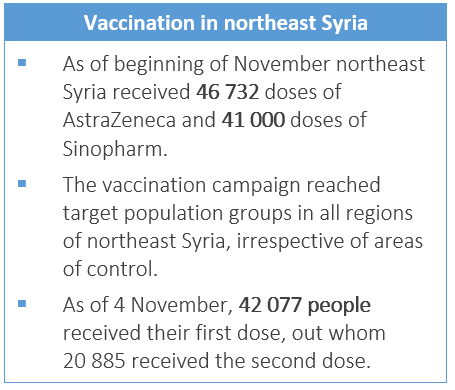 Priority groups
Priority groups
As per the National Deployment and Vaccination Plan, the vaccination priority groups include high-risk population groups such as: 1) health workers; 2) the elderly; and 3) people with co-morbidities. Since September 2021 all adults over 18 have been offered the vaccine.
Challenges
Arrival of vaccines late in a year makes it difficult for timely implementation of vaccination putting pressure on already fragile health system. However, the more vaccines are supplied the closer we are to achieve the national target of 20% of vaccination coverage by end of 2021, to reduce severe complications and deaths from COVID-19 and combat the pandemic.


